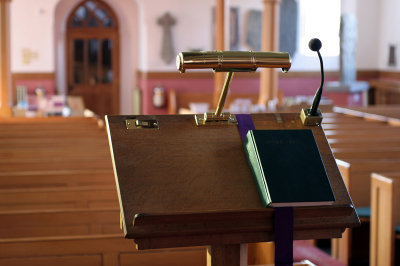You're probably not a pastor. Good

You’re probably not a pastor. And God intended it that way.
You probably still feel guilty that at some point in your youth you “failed” to “surrender” to the ministry. I know. I was once an Evangelical teenager, too.
But it is no accident that God called most people to something else entirely. The Levites were but one tribe among twelve, the priests an even smaller subset still. In my church there are a handful of official ministers, but hundreds of bankers, teachers, and janitors.
Are these so-called laymen in sin? Are they somehow “less than”? Did they miss the portion of 1 Corinthians 12 which teaches that “the parts of the body of Christ shall be the pastor, the music minister, the missionaries and the nursery workers”?
No.
The B+ answers tend to run as follows. First, all believers are obligated by the Great Commission. We are all responsible for telling others about the great grace we have received, and moreover, those several hundred church members can reach (frequently with more perceived authenticity) far more people than my one poor pastor ever can. Oh, and second: try to run a church without money. Someone has to make that money. Your job is the church’s ATM.
These answers aren’t actually wrong. They are fine as far as they go. But they are still clergy-centric. They assume that formal Gospel ministry is everything, the only thing, and all other things exist in a junior, auxiliary role. In effect, we non-seminarians are just candy stripers for Jesus.
This view is not at all biblical. Nor is it helpful.
Before there was a Fall, there were callings. God created man and immediately gave him marching orders: to fill the Earth, subdue it, and have dominion over it.
Like Daddy in his garage, our Father completed His project of the world to just that point at which His children could help, whereupon He included us, making us His co-workers in finishing the creation. We see a glimpse of the final product in Revelation 21, the garden made a city, containing all the imagery of Eden in perfected (and interestingly enough, urban and technologically advanced) form. The only difference between the end and the beginning beyond completion is population.
The Fall did nothing to change this. God repeated His command, His “Creation Mandate,” to Noah. Sin merely added another dimension to the project: not only must the world be finished physically, but the men must be made anew as well.
This is wonderful news for all of us. Why? Because it means our callings matter. The doctor, the carmaker, the bank teller – all are doing things that alleviate human suffering, that push back the Curse. Likewise the inventors, the innovators, the Thomas Edisons and Robert Fultons: each works in fulfillment of that original command, to solve the puzzles of creation, to help finish what our Father began in history’s first five days. It is the continuing glory of such “kings” to search out those matters that God in His glory has concealed.
The jobs most of us have six days a week serve this end: the completion of God’s plan of creation. This is true even before we witness for Christ in our workplaces: our work is worthy, important, and essential to God’s plan, in and of itself. We need the hardworking farmer, the diligent insurance agent, the brilliant rocket scientist. Their work helps reclaim bits of what was lost in the Fall; and more than that, our Father has called them to think His thoughts after Him, and act upon them.
And before all of that, on the first day, we get to worship Him, the God not merely of church but of all creation, led and taught by those He called to minister to us.
Originally published at Clear Truth Media.
Rod D. Martin, founder and CEO of The Martin Organization, is a technology entrepreneur and futurist from Destin, Florida. He was a senior advisor to PayPal founder and CEO Peter Thiel, served as policy director to Governor Mike Huckabee, and was thrice elected president of the National Federation of Republican Assemblies. He is a member of the Florida Baptist Convention’s State Board of Missions and a former officer of the Executive Committee of the Southern Baptist Convention.




























